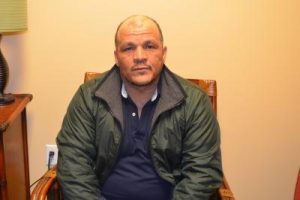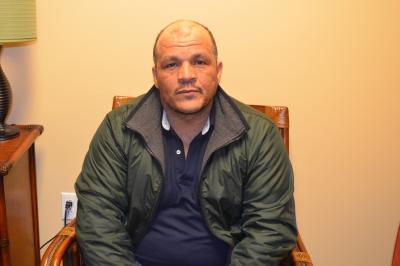By Margaret Angus, Nova Scotia Health Authority, 12 May 2017.
 For 22 years, Moussa Saad smoked 20 cigarettes a day. With a pack of cigarettes costing only $0.15 in Saad’s home of Damascus, Syria, it was an easy habit to pick up and a hard one to let go. When Saad arrived in Nova Scotia from war-torn Syria a year ago, he quickly realized that smoking was much more expensive and far less socially acceptable in Canada.
For 22 years, Moussa Saad smoked 20 cigarettes a day. With a pack of cigarettes costing only $0.15 in Saad’s home of Damascus, Syria, it was an easy habit to pick up and a hard one to let go. When Saad arrived in Nova Scotia from war-torn Syria a year ago, he quickly realized that smoking was much more expensive and far less socially acceptable in Canada.
Today, thanks to a Stop Smoking program offered by Nova Scotia Health Authority (NSHA) and Immigrant Services Association of Nova Scotia (ISANS), Saad is a non-smoker.
“Before the program, I didn’t know it was possible to cut smoking,” said Saad, who smoked for 22 years.
The most powerful motivator for Saad to stop smoking was financial. He was spending $20 a day on cigarettes and “thinking of people in Syria who can’t buy bread.”
Both ISANS and NSHA recognized the need for stop smoking programs to help new Canadians, particularly refugees.
“People are being uprooted from their home country in a very volatile situation,” said Community Outreach Worker and program facilitator Cory Goodine. “A lot of their families are still experiencing violence. Program participants talked about how they smoke cigarettes to relax.”
The program, made up of three two-hour sessions, was offered in the Fall of 2016 to help meet the needs of those who had recently come to Canada from Syria. It covered a number of topics, including how to manage stress without smoking and how to properly and effectively use nicotine replacement therapy.
Carmen Celina Moncayo, Co-ordinator of the ISANS Community Wellness Program, said while new Canadians could attend one of NSHA’s standard stop smoking programs, “It’s different when you are sharing a similar experience. Everyone was supporting each other.”
Goodine tailored the program to participants, using the services of an Arabic interpreter, relying on visuals instead of text, and learning about specific circumstances that might affect participants’ success.
While standard stop smoking groups average 10 to 12 participants, this group numbered closer to 20. Even more telling than their numbers has been their success.
“People had been smoking for years and smoking a lot,” said Goodine. “The very first week, there were huge reductions in smoking.”
Moncayo agreed. “All of the participants either reduced the amount they smoked or stopped completely.”
Due to the success of the program and the number of additional ISANS clients who have expressed interest in participating, another session will be offered this spring.
Now that Saad is six-months smoke-free, he’s breathing easier, literally. He has also designated his home a smoke-free zone to visitors. He hopes his success will encourage others to stop smoking.
“I try to change minds,” he said. “In a healthy community, it’s easy to cut smoking.”
